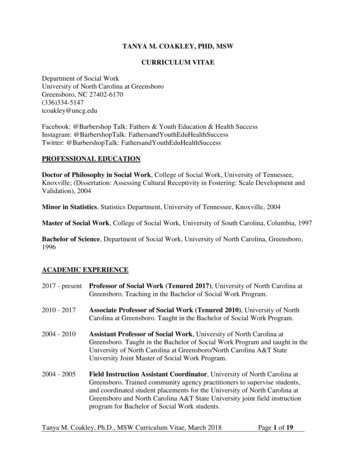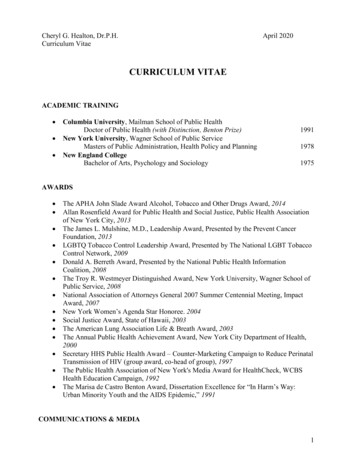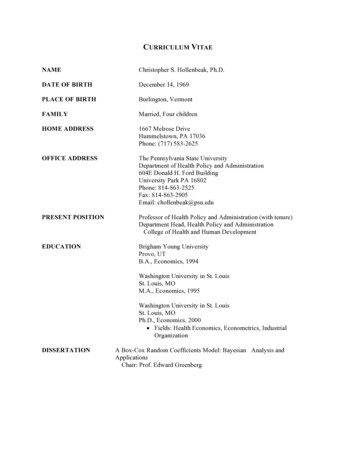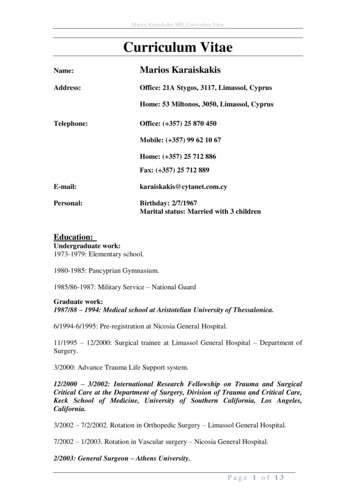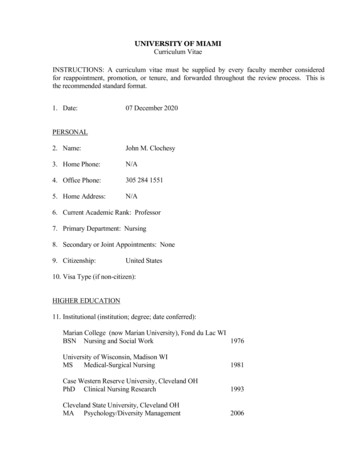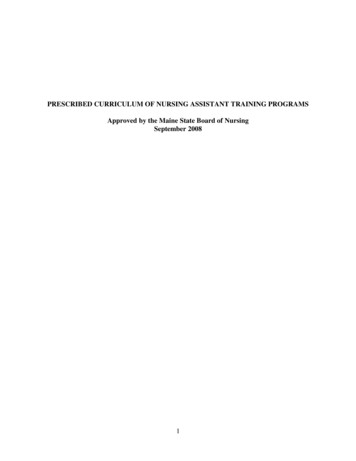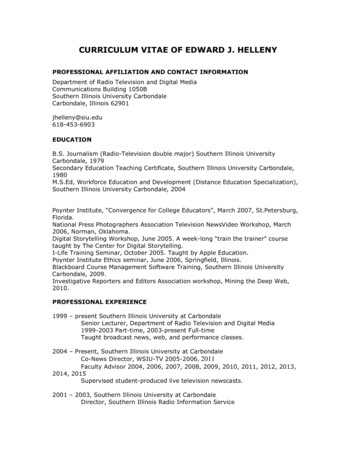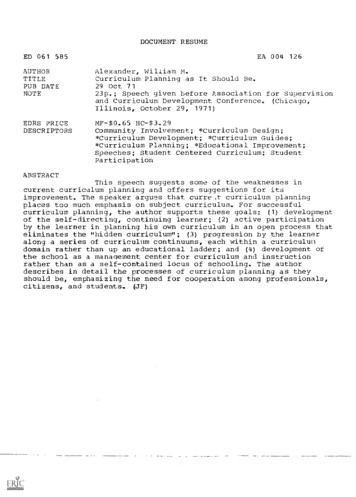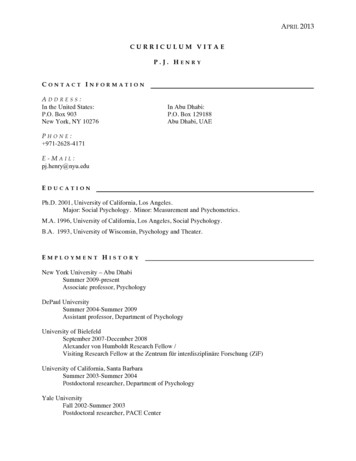
Transcription
APRIL 2013CURRICULUM VITAEP.J. HENRYCONTACT INFORMATIONADDRESS:In the United States:P.O. Box 903New York, NY 10276In Abu Dhabi:P.O. Box 129188Abu Dhabi, UAEPHONE: 971-2628-4171E-MAIL:pj.henry@nyu.eduEDUCATIONPh.D. 2001, University of California, Los Angeles.Major: Social Psychology. Minor: Measurement and Psychometrics.M.A. 1996, University of California, Los Angeles, Social Psychology.B.A. 1993, University of Wisconsin, Psychology and Theater.EMPLOYMENT HISTORYNew York University – Abu DhabiSummer 2009-presentAssociate professor, PsychologyDePaul UniversitySummer 2004-Summer 2009Assistant professor, Department of PsychologyUniversity of BielefeldSeptember 2007-December 2008Alexander von Humboldt Research Fellow /Visiting Research Fellow at the Zentrum für interdisziplinäre Forschung (ZiF)University of California, Santa BarbaraSummer 2003-Summer 2004Postdoctoral researcher, Department of PsychologyYale UniversityFall 2002-Summer 2003Postdoctoral researcher, PACE Center
P.J. Henry 2American University of BeirutFall 2001-summer 2002.Assistant professor, Department of Social and Behavioral SciencesUniversity of California, Los AngelesSummer 2001.Visiting lecturer, Department of PsychologyGRANTSTimesharing Experiments in the Social Sciences (TESS) project #113: “Stigmatization as an Explanationfor the Authoritarianism of the Uneducated.” Awarded by Jeremy Freese and Penny Visser, PrincipalInvestigators, National Science Foundation Grant 0818839.Spring 2012, awarded with coauthor Mark Brandt.Summer Research Grant, DePaul UniversitySummer 2007, 4200Undergraduate Research Assistance Summer Grant, DePaul UniversitySummer 2006, 1600Summer Research Grant, DePaul UniversitySummer 2005, 4000Undergraduate Research Assistance Summer Grant, DePaul UniversitySummer 2005, 675University Research Board Research Grant, American University of BeirutSpring 2002, 3338MANUSCRIPTS AND PUBLICATIONS(* indicates work conducted with undergraduate, graduate student, or postdoc at the time)PUBLICATIONS WITH 100 CITATIONS ON GOOGLE SCHOLARSears, D. O, & Henry, P. J. (2005). Over thirty years later: A contemporary look at symbolic racism andits critics. Advances in Experimental Social Psychology, 37, 95-150.Sears, D. O., & Henry, P. J. (2003). The origins of symbolic racism. Journal of Personality and SocialPsychology, 85 (2), 259-275.Henry, P. J., & Sears, D. O. (2002). The symbolic racism 2000 scale. Political Psychology, 23, 253-283.Sears, D. O., Henry, P. J., & Kosterman, R. (2000). Egalitarian values and the origins of contemporaryAmerican racism. In D.O. Sears, J. Sidanius, & L. Bobo (Eds.), Racialized politics: The debateabout racism in America (pp. 75-117). University of Chicago Press: Chicago.
P.J. Henry 3INVITED CHAPTERS AND JOURNAL RESUBMISSIONS*Feygina, I., & Henry, P. J. (invited chapter). Culture and prosocial behavior. To appear in D. Schroeder& B. Graziano (Eds.), The Oxford handbook of prosocial behavior. New York: Oxford UniversityPress.Henry, P. J. (invited chapter). Antidominance as a motive of low-power groups in conflict. To appear inH. Pishwa & R. Schulze (Eds.), Expression of inequality in interaction: power, dominance, andstatus. Amsterdam: John Benjamins.IN PRESSHenry, P. J. (in press). Culture and social class. To appear in A. Cohen (Ed.), New directions in thepsychology of culture. Washington, DC: American Psychological Association.PUBLICATIONS*Brandt, M. J., & Henry, P. J. (2012). Gender inequality and gender differences in authoritarianism.Personality and Social Psychology Bulletin, 38, 1301-1315.*Brandt, M. J., & Henry, P. J. (2012). Psychological defensiveness as a mechanism explaining therelationship between low socioeconomic status and religiosity. International Journal for thePsychology of Religion, 22, 321–332.Henry, P. J. (2011). The role of group-based status in job satisfaction: Workplace respect matters morefor the stigmatized. Social Justice Research, 24, 231-238.Henry, P. J. (2011). The role of stigma in understanding ethnicity differences in authoritarianism.Political Psychology, 32, 419-438.Henry, P. J. (2010). Institutional bias. In J. F. Dovidio, M. Hewstone, P. Glick, & V. M. Esses (Eds.),Handbook of prejudice, stereotyping, and discrimination (426-440). London: Sage.Henry, P. J. (2010). Civil rights legislation. In J. Levine & M. Hogg (Eds.), The encyclopedia of groupprocesses and intergroup relations, Vol. 1 (pp. 83-86). Thousand Oaks, CA: Sage Publications.Henry, P. J. (2010). Modern racism. In J. Levine & M. Hogg (Eds.), The encyclopedia of group processesand intergroup relations, Vol 2 (pp. 575-577). Thousand Oaks, CA: Sage Publications.Henry, P. J., & Pratto, F. (2010). Power and racism. In A. Guinote & T. Vescio (Eds.), The socialpsychology of power (pp. 341-362). New York: Guilford.Henry, P. J. (2009). Low-status compensation: A theory for understanding the role of status in cultures ofhonor. Journal of Personality and Social Psychology, 97, 451-466.Henry, P. J., & Sears, D. O. (2009). The crystallization of contemporary racial prejudice across thelifespan. Political Psychology, 30, 569-590.Zick, A., & Henry, P. J. (2009). Nach oben buckeln, nach unten treten – Der deutsche Autoritarismus.(From above and below: German authoritarianism.) In W. Heitmeyer (Ed.), Deutsche Zustände2008 (German States, 2008), pp. 190-204. Frankfurt am Main, Germany: Suhrkamp.
P.J. Henry 4Henry, P. J. (2008). College sophomores in the laboratory redux: Influences of a narrow data base onsocial psychology’s view of the nature of prejudice. Psychological Inquiry, 19, 49-71.Henry, P. J. (2008). Student sampling as a theoretical problem. Psychological Inquiry, 19, 114-125.Henry, P. J. (2008). Review of The handbook of social psychology by A. W. Kruglanski & E. T. Higgins.Political Psychology, 29, 792-797.Henry, P. J., & Sears, D. O. (2008). Symbolic and modern racism. In J. H. Moore (Ed.), Encyclopedia ofRace and Racism (vol. 3), pp. 111-117. Farmington Hills, MI: Macmillan Reference.Sears, D. O., Fu, M. Y., Henry, P. J., & Bui, K. (2008). The origins and persistence of ethnic identityamong the ‘new immigrant’ groups. In J. Sidanius, S. Levin, C. van Laar, & D. O. Sears (Eds.),The diversity challenge: Social identity and intergroup relations on the multiethnic campus (pp.136-162). New York: Russell Sage Foundation.Sears, D. O., Haley, H., & Henry, P. J. (2008). Cultural diversity and sociopolitical attitudes at collegeentry. In J. Sidanius, S. Levin, C. van Laar, & D. O. Sears (Eds.), The diversity challenge: Socialidentity and intergroup relations on the multiethnic campus (pp. 65-99). New York: Russell SageFoundation.Sears, D. O., & Henry, P. J. (2008). The overall effects of college on students’ sociopolitical attitudes. InJ. Sidanius, S. Levin, C. van Laar, & D. O. Sears (Eds.), The diversity challenge: Social identityand intergroup relations on the multiethnic campus (pp. 100-135). New York: Russell SageFoundation.Henry, P. J., & Reyna, C. (2007). Value judgments: The impact of perceived value violations onpolitical attitudes. Political Psychology, 28, 273-298.Sears, D. O., & Henry, P. J. (2007). Symbolic racism. In R. Baumeister & K. Vohs (Eds.), Encyclopediaof Social Psychology (pp. 963-964). Thousand Oaks, CA: Sage.Henry, P. J., & Hardin, C. D. (2006). The contact hypothesis revisited: Status bias in the reduction ofimplicit prejudice in the United States and Lebanon. Psychological Science, 17, 862-868. Reprinted in: Lesko, W. (2009). Readings in social psychology: General, classic, andcontemporary selections (7th ed.). Upper Saddle River, NJ: Allyn & Bacon.Henry, P. J., & *Saul, A. (2006). The development of system justification in the developing world.Social Justice Research, 19, 365-378.Reyna, C., Henry, P. J., *Korfmacher, W., & *Tucker, A. (2006). Examining the principles in principledconservatism: The role of responsibility stereotypes as cues for deservingness in racial policydecisions. Journal of Personality and Social Psychology, 90, 109-128.Alexander, M., Levin, S., & Henry, P. J. (2005). Image theory, social identity, and social dominance:Structural characteristics and individual motives underlying international images. PoliticalPsychology, 26, 27-45.Henry, P. J., Sidanius, J., Levin, S., & Pratto, F. (2005). Social dominance orientation, authoritarianism,and support for intergroup violence between the Middle East and America. Political Psychology,26, 569-583.
P.J. Henry 5Henry, P. J., Sternberg, R. J., & Grigorenko, E. (2005). Capturing successful intelligence throughmeasures of analytic, creative, and practical skills. In O. Wilhelm & R. Engle (Eds.),Understanding and measuring intelligence (pp 295-311). Thousand Oaks, CA: SagePublications.Reyna, C., *Tucker, A., *Korfmacher, W., & Henry, P. J. (2005). Searching for common ground betweensupporters and opponents of affirmative action. Political Psychology, 26, 667-682.Henry, P. J., Reyna, C. E., & Weiner, B. (2004). Hate welfare but help the poor: How the attributionalcontent of stereotypes explains the paradox of reactions to the destitute in America. Journal ofApplied Social Psychology, 34 (1), 34-58.Sidanius, J., Henry, P. J., Pratto, F., & Levin, S. (2004). Arab attributions for the attack on America: Thecase of Lebanese sub-elites. Journal of Cross-Cultural Psychology, 35 (4), 403-416 . Reprinted in: Victoroff, J., & Kruglanski, A. W. (Eds.). (2009). Psychology of terrorism:Classic and contemporary insights (pp. 269-279). New York: Psychology Press.Henry, P. J. (2003). The lessons of politically twisting histories: Review of Kattago, S. (2001),Ambiguous memory: The Nazi past and German national identity. Contemporary Psychology,48 (6).Levin, S., Henry, P. J., Pratto, F., & Sidanius, J. (2003). Social dominance and social identity inLebanon: Implications for terrorism and counter-terrorism support. Group Processes andIntergroup Relations, 6 (4), 353-368. Reprinted in: Victoroff, J., & Kruglanski, A. W. (Eds.). (2009). Psychology of terrorism:Classic and contemporary insights (pp. 253-267). New York: Psychology Press.Pratto, F., *Lemieux, A. F., *Glasford, D. E., & Henry, P. J. (2003). American and Lebanese collegestudents’ responses to the events of September 11, 2001: The relation of hopes and fears to thepsychology of group positions. Psicologica Politica, 27, 13-35.Sears, D. O., Fu, M. Y., Henry, P. J., & Bui, K. (2003). The origins and persistence of politicized ethnicidentity among the ‘new immigrant’ groups. Social Psychology Quarterly, 66 (4), 419-437.Sears, D. O., & Henry, P. J. (2003). Race and politics: The theory of symbolic racism. In J. Kawada &Y. Araki (Eds.), Handbook: Political psychology (pp. 100-114). Tokyo: Hokuju Publishers.Sears, D. O., & Henry, P. J. (1999). Ethnic identity and group threat in American politics. The PoliticalPsychologist, 4 (1), 12-17.MEDIA COVERAGERADIO INTERVIEWSÖsterreichischer Rundfunk 1 (Ö1; Austrian Broadcasting). Program: Dimensionen (Dimensions). Title:Gerechtigkeit und Status (Justice and Status). Broadcast on July 4, 2008, 7:05 pm.ONLINE MAGAZINES
P.J. Henry 6Personality and Social Psychology Connections, Men, Women, and Authoritarianism: A Cross-CulturalAnalysis, October 22, 2012, /2/.Scientific American, The Psychology of Social Status (by Adam Waytz), December 8, 2009,scientificamerican.com.PRESENTATIONSINVITED PRESENTATIONS & COLLOQUIADePaul University, Experimental Psychology Program (2013, January)American University of Sharjah, Department of International Studies (2012, March)Dubai Psychology Network, Speaker Series (2010, September)New York University, Social Psychology Speaker Series (2010, Feburary)Northwestern University, Summer Institute in Social Psychology (2009, July)DePaul University, Joint Public Health Program and Psychology Department Colloquium (2009, June)Cardiff University, Social Psychology Seminar Series (2008, October)University of Salzburg, Department of Psychology Colloquium (2008, June)University of Bielefeld, Social Psychology Colloquium (2008, May)University of Bielefeld, Center for Interdisciplinary Research Lecture Series (2007, December)University of Jena, Department of Social Psychology Colloquium (2007, November)Marquette University, Psychology Department Colloquium (2006, March)University of Wisconsin, Madison, Social Psychology Speaker Series (2005, November)University of Chicago, Political Psychology Workshop (2005, May)Northwestern University, Social Psychology Speaker Series (2005, April)University of Illinois, Chicago, Social Psychology Speaker Series (2004, October)University of California, Santa Barbara, Social Psychology Speaker Series (2003, November)University of California, Los Angeles, Institute for Social Science Research (2003, March)University of Connecticut, Social Psychology Speaker Series (2003, January)Yale University, Social Psychology Speaker Series (2002, September)American University of Beirut, Center for Behavioral Research (2001, December)CONFERENCE TALKS(* indicates work conducted with undergraduate, graduate student, or postdoc at the time)Henry, P. J., & Brandt, M. J. (2012, August). The attractions of authoritarianism for the stigmatized.Paper presented at the annual meeting of the British Psychological Society (BPS), St. Andrews,Scotland.
P.J. Henry 7*Brandt, M. J., & Henry, P. J. (2012, July). A society’s value of education increases the relationshipbetween education and authoritarianism. Paper presented at the annual meeting of theInternational Society for Political Psychology (ISPP), Chicago.*Brandt, M. J., & Henry, P. J. (2012, April). A society’s value of education increases the relationshipbetween education and authoritarianism. Paper presented at the annual meeting of the MidwestPolitical Science Association (MPSA), Chicago.Henry, P. J. (2011, July). Social inequality and social change. Roundtable presentation given at the annualmeeting of the International Society for Political Psychology (ISPP), Istanbul.*Brandt, M. J., & Henry, P. J. (2011, May). Gender and authoritarianism: Cross-cultural predictions fromstigma compensation theory. Paper presented at the annual meeting of the MidwesternPsychological Association (MPA), Chicago.Henry, P. J. (2010, August). Intergroup differences in the importance of honor: Perspectives from lowstatus compensation theory. Paper presented at the Small Group Meeting on Honor sponsored bythe European Association for Social Psychology (EASP), Barcelona.Henry, P. J. (2010, January). Low-status compensation: A theory for understanding the role of status incultures of honor. Paper presented at the annual meeting of the Society for Personality and SocialPsychology (SPSP), Las Vegas.Henry, P. J. (2009, June). Low-status compensation: A theory to predict group-based status differences inauthoritarian attitudes. Paper presented at the 12th Jena Workshop on Intergroup Processes, Jena,Germany.Henry, P. J. (2009, June). Is there a sociobiological basis for behavioral asymmetry? Paper presented atthe Social Dominance Theory Development Conference, Harvard University.*Brandt, M. & Henry, P. J. (2009, May). Conceptualizing the status-religiosity relationship at theaggregate level. Paper presented at the annual meeting of the Midwestern PsychologicalAssociation (MPA), Chicago.Henry, P.J. (2009, April). Low-status compensation theory. Paper presented at the annual meeting of theSocial Psychologists of Chicago (SPOC), Chicago.Henry, P. J. (2008, September). Low-status compensation: A theory for understanding the roots andtrajectory of violence. Paper presented at the Final Conference: Control of Violence, Center forInterdisciplinary Research, Bielefeld, Germany.Henry, P. J. (2008, June). Unexpected legitimizing ideologies: The case of the language of democracy.Paper presented at the general meeting of the European Association of Experimental SocialPsychology (EAESP), Opatija, Croatia.Sears, D. O., & Henry, P. J. (2008, June). The pre-adult political socialization hypothesis revisited. Paperpresented at the biannual meeting of the Society for the Study of Social Issues (SPSSI), Chicago.Henry, P. J. (2008, April). Discussant: Out of control? Explaining terrorist violence from a Jihadiperspective, by K. Al-Hashimi. Presented at the Workshop on Explanatory Patterns andControllability of Terrorist Violence, Center for Interdisciplinary Research, Bielefeld, Germany.
P.J. Henry 8Henry, P. J., & Reyna, C. (2007, August). A model of value expressions and their influence on politicalattitudes. Paper presented at the annual meeting of the American Political Science Association(APSA), Chicago.Henry, P. J., & Davis, J. (2007, June). Group-based asymmetries in social justice needs. Paper presentedat the Small Group Meeting on Social Stigma and Social Disadvantage sponsored by theEuropean Association of Experimental Social Psychology (EAESP), Leiden, the Netherlands.Reyna, C., & Henry, P. J. (2007, May). A model of value expressions: Predicting affect, self-esteem, andpolitical attitudes. Paper presented at the annual meeting of the Midwestern PsychologicalAssociation (MPA), Chicago.*Zimmerman, J., & Henry, P. J. (2007, May). The everyday gender hierarchy: Expressing maledominance through recreational preferences. Paper presented at the annual meeting of theMidwestern Psychological Association (MPA), Chicago.Henry, P. J., & *Davis, J. (2007, April). Group-based asymmetries in social justice needs. Paperpresented at the Psychology and Social Justice Conference, New York.Henry, P. J. (2007, April). The role of loss of control in social dominance processes. Paper presented atthe Zentrum für interdisziplinäre Forschung (ZiF), Control of Violence Preparatory Conference,Bielefeld, Germany.Henry, P. J., & *Davis, J. (2007, March). Group-based asymmetries in social justice needs. Paperpresented at the annual meeting of the Social Psychologists of Chicago (SPOC), Chicago.Henry, P. J. (2007, January). Democracy as legitimizing ideology. Paper presented at the annual meetingof the Society for Personality and Social Psychology (SPSP), Memphis.*Zimmerman, J., & Henry, P. J. (2006, May). How ambivalent is ambivalent sexism? Paper presented atthe annual meeting of the Midwestern Psychological Association (MPA), Chicago.Henry, P.J., & *Zimmerman, P.J. (2006, April). How ambivalent is ambivalent sexism? Paper presentedat the annual meeting of the Social Psychologists of Chicago (SPOC), Chicago.Alexander, M., Levin, S., & Henry, P. J. (2004, July). Social identity and social dominance: Individualmotives underlying international images. Paper presented at the annual meeting of theInternational Society for Political Psychology (ISPP), Lund, Sweden.Henry, P.J., Hardin, C., & *Shalhoub, R. (2004, June). Status asymmetries in the effects of intergroupcontact on automatic expressions of bias. Paper presented at the Small Group Meeting onConscious and Unconscious Attitudinal Processes sponsored by the European Association ofExperimental Social Psychology (EAESP), Madrid, Spain.Henry, P. J., & Sears, D. O. (2003, July). The preadult acquisition and later persistence of symbolicracism. Paper presented at the annual meeting of the International Society for PoliticalPsychology (ISPP), Boston.Henry, P. J., Sidanius, J., Levin, S., & Pratto, F. (2003, July). Social dominance, social identity, andreactions to the events of September 11. Paper presented at the annual meeting of theInternational Society for Political Psychology (ISPP), Boston.
P.J. Henry 9Levin, S., Henry, P. J., Pratto, F., & Sidanius, J. (2003, July). Social dominance and social identity inLebanon after September 11, 2001. Paper presented at the annual meeting of the InternationalSociety for Political Psychology (ISPP), Boston.Sidanius, J., Henry, P. J., Pratto, F., & Levin, S. (2003, July). Arab attributions for the 9/11 attack onAmerica. Paper presented at the annual meeting of the International Society for PoliticalPsychology (ISPP), Boston.Sears, D. O., Henry, P. J., & Tarman, C. (2003, February). Over thirty years later: A contemporary lookat symbolic racism and its critics. Paper presented at the Attitudes Preconference of the Societyfor Personality and Social Psychology (SPSP), Los Angeles.Henry, P. J. (2002, October). Support for terrorism in the Middle East. Paper presented at the annualmeeting of the Society for Experimental Social Psychology (SESP), Columbus, Ohio.Sears, D. O., Henry, P. J., Fu, M. Y., & Bui, K. (2001, July). The origins and persistence of ethnicidentity among contemporary American university students. Paper presented at the annualmeeting of the International Society for Political Psychology (ISPP), Cuernavaca, Mexico.Henry, P. J., & Sears, D. O. (2000, July). The origins of symbolic racism: The blend of racial affect andindividualism is more than the sum of its parts. Paper presented at the annual meeting of theInternational Society for Political Psychology (ISPP), Seattle.Sears, D. O., & Henry, P. J. (2000, July). The theory of symbolic racism after thirty years: A currentappraisal. Paper presented at the annual meeting of the International Society for PoliticalPsychology (ISPP), Seattle.Henry, P. J., & Sears, D. O. (2000, June). The politicization of ethnic identity in a multicultural collegeenvironment. Paper presented at the annual meeting of the Society for the Psychological Studyof Social Issues (SPSSI), Minneapolis.Henry, P. J., & Weiner, B. (1999, August). Hate welfare but help the poor: The paradox of reactions tothe destitute in America. Paper presented at the annual meeting of the American PsychologicalAssociation (APA), Boston.Henry, P. J., & Sears, D. O. (1999, August). Ethnic identity and contemporary campus diversity. Paperpresented at the Society for the Psychological Study of Social Issues (SPSSI) Conference onImmigrants and Immigration, Toronto.Henry, P. J., & Sears, D. O. (1998, July). Ethnic identity within a diverse campus environment. Paperpresented at the annual meeting of the International Society for Political Psychology (ISPP),Montréal.Henry, P. J., & Sears, D. O. (1998, June). Ethnic identity within a diverse campus environment. Paperpresented at the annual meeting of the Society for the Psychological Study of Social Issues(SPSSI), Ann Arbor.Sears, D.O, Henry, P.J., & Kosterman, R. (1997, November). Egalitarian values and the origins ofcontemporary American racism. Paper presented at the UCLA Conference on Racism, Ideology,and Politics, Los Angeles.
P.J. Henry 10CONFERENCE POSTERS AND INFORMAL PAPERS*Brandt, M. J., & Henry, P. J. (2012, January). Gender inequality and gender differences inauthoritarianism across 55 societies. Poster to be presented at the annual meeting of the Societyfor Personality and Social Psychology (SPSP), San Diego.o Winner, SPSP 2012 Student Poster Award (to first author)Henry, P. J., & *Brandt, M. J. (2011, July). Societal gender inequality as a predictor of gender differencesin authoritarianism endorsement. Poster presented at the 16th General Meeting of the EuropeanAssociation of Social Psychology (EASP), Stockholm, Sweden.*Butler, S. & Henry, P.J. (2010, January). What's in a name?: Cultural understanding of reactions toinsults as explained by the theory of low-status compensation. Poster presented at the annualmeeting of the Society for Personality and Social Psychology, Las Vegas.*Butler, S. & Henry, P.J. (2009, February). You can't call me that: Reactions to insults as explained bythe theory of Low Status Compensation. Poster presented at the annual meeting of the Society forPersonality and Social Psychology, Tampa, FL.*Davis, J., & Henry, P. J. (2009, February). Low status compensation theory and the justice preferencescale. Poster presented at the annual meeting of the Society for Personality and SocialPsychology, Tampa, FL.Henry, P. J. (2008, April). Social dominance and support for violence in global conflicts. Posterpresented at the Network Meeting of the Alexander von Humboldt Foundation, Berlin, Germany.*Davis, J., & Henry, P. J. (2008, February). The culture of the lab: Influences of the college setting onsocial psychology’s view of the nature of prejudice. Poster presented at the annual meeting of theSociety for Personality and Social Psychology, Albuquerque, NM.Henry, P. J. (2006, October). Democracy as a legitimizing ideology. Informal paper presented at theannual meeting of the Society for Experimental Social Psychology (SESP), Philadelphia, PA.Henry, P. J., & *Saul, A. (2006, January). The development of system justification in the developingworld. Poster presented at the annual meeting of the Society for Personality and SocialPsychology, Palm Springs, CA.Reyna, C., & Henry, P. J. (2006, January). Value judgments: The impact of perceived value violationson political attitudes. Poster presented at the annual meeting of the Society for Personality andSocial Psychology, Palm Springs, CA.Reyna, C., *Tucker, A., *Korfmacher, W., & Henry, P. (2005, May). Searching for common groundbetween supporters and opponents of affirmative action. Poster presented at the annual meeting ofthe American Psychological Society, Los Angeles, CA.Henry, P.J., & Weiner, B. (1998, May). The role of values in attitudes toward welfare. Poster presentedat the annual meeting of the American Psychological Society, Washington, DC.
P.J. Henry 11Henry, P.J., & Hardin, C.D. (1997, May). Suppression increases stereotype accessibility but not seatingdistance from Blacks and Southerners. Poster presented at the annual meeting of the AmericanPsychological Society, Washington, DC.PROFESSIONAL EXPERIENCEAD HOC REVIEWER: GRANTS (PAST 5 YEARS ONLY) National Science Foundation Israeli Science Foundation Time-Sharing Experiments for the Social Sciences (TESS)AD HOC REVIEWER: JOURNALS (PAST 5 YEARS ONLY) American Journal of Political Science Motivation and Emotion American Political Science Review Personality and Individual Differences Analyses of Social Issues and Public Policy Personality and Social Psychology Bulletin Basic and Applied Social Psychology Political Behavior British Journal of Social Psychology Political Psychology Cognition and Emotion Psychological Science Cross-Cultural Research Self and Identity European Journal of Social Psychology Sex Roles Group Processes and Intergroup Relations Social Cognition Human Relations Social Justice Research International Sociology Social Problems Journal of Applied Social Psychology Social and Personality Psychology Compass Journal of Community and Applied SocialPsychology Social Psychological and PersonalityScience Journal of Experimental Social Psychology Social Science Quarterly Journal of Individual Differences Social Science Research Journal of Personality and SocialPsychology Swiss Journal of PsychologyPROFESSIONAL MEMBERSHIPSAmerican Psychological Society (APS)International Society of Political Psychology (ISPP)Society for Personality and Social Psychology (SPSP)
P.J. Henry 12Society for the Psychological Study of Social Issues (SPSSI)Society of Experimental Social Psychology (SESP)FELLOWSHIPS AND AWARDSAlexander von Humboldt Fellowship, University of Bielefeld, 2008.Zentrum für Interdisziplinäre Forschung Fellow, University of Bielefeld, 2007-2008.Selected participant, Summer Workshop on Teaching About Terrorism (SWOTT), University ofOklahoma, July 2007Nomination for Excellence in Teaching Award, DePaul University, College of Liberal Arts and Sciences,2007Membership in the Society for Experimental Social Psychology (SESP), 2006Nomination for Dissertation of the Year Award, Department of Psychology, UCLA, 2001University Fellowship, University of California, Los Angeles, 1994-1995Phi Beta Kappa, 1991Complete tuition music scholarship to University of Wisconsin, 1989-1993
P.J. Henry 13TEACHINGSUMMER SCHOOL TEACHINGVisiting Professor, Summer School Workshop for the Graduate School “Group Focused Enmity”University of Bielefeld and the University of MarburgBad Laasphe, GermanySeptember, 2007COURSES CURRENTLY TEACHINGPrejudiceIntroduction to PsychologySocial PsychologyCOURSES PREVIOUSLY TAUGHTGraduate Statistics I (DePaul University, American University of Beirut)Graduate Social Psychology (DePaul University)Undergraduate Social Psychology (DePaul University, American University of Beirut)Undergraduate Introduction to Psychology (DePaul University)Undergraduate Mathematical and Technological Literacy (DePaul University)Undergraduate Research Methods (American University of Beirut)Undergraduate Seminar in Prejudice and Intergroup Conflict (American University of Beirut)THESIS COMMITTEESMaster’s Thesis Committees: Mary Margaret Montgomery (chair) – in progressAndrea Briggs – successfully defended 7/15/08Jessica Hudson – successfully defended 2/25/08Megha Tailor – successfully defended 7/14/08Dissertation Committees: Jim Davis (chair) – in progressAnna Huynh – successfully defended 10/21/08Brian Patterson – successfully defended 11/20/07
P.J. Henry 14TEACHING RATINGSMeans reflect responses to item “Rate the instructor overall.”Courses rated on a 5-point scale: 5 Excellent, 4 Good, 3 Satisfactory, 2 Fair, 1 Poor.Mean SDNIntroduction to PsychologyFall 2010Fall 20114.34.90.70.3916PrejudiceFall 2010Fall 20114.44.80.70.61012Social PsychologySpring 20114.60.712
Dubai Psychology Network, Speaker Series (2010, September) New York University, Social Psychology Speaker Series (2010, Feburary) Northwestern University, Summer Institute in Social Psychology (2009, July) DePaul University, Joint Public Health Program and Psychology Department Colloquium (2009, June)
